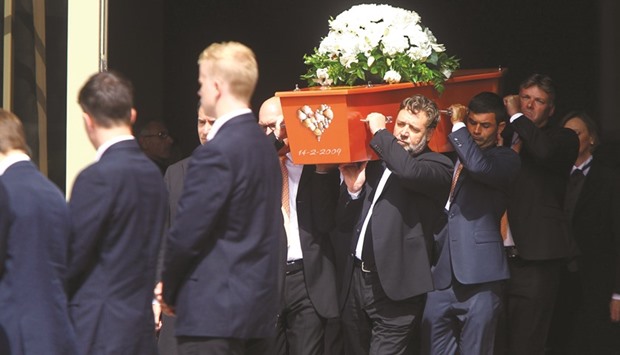Cricketing greats honoured Martin Crowe at an emotional funeral for New Zealand’s greatest batsman yesterday, with his cousin, Hollywood star Russell Crowe, acting as a pallbearer.
About 1,000 mourners packed Auckland’s Holy Trinity Cathedral to remember Crowe, who died on March 4 aged 53 after a long battle with cancer.
The batsman’s brother Jeff, himself a former Black Caps captain, said the family had been touched by the outpouring of grief from across the cricketing world. He was in Bangladesh on umpiring duties when Martin died and said there were heartfelt tributes from many involved in the game, including “a new Indian cricket generation”.
“It had never really dawned on me... what a huge splash he made, what a true inspiration he was,” Crowe senior told the service.
“Wasim Akram reminded me just the other day that Martin was the greatest batsman he ever bowled to—no higher praise than that,” he added.
Former teammates shared memories of a player who averaged 45.36 despite being plagued by injury in his 77-Test career, hitting 17 centuries—still a New Zealand record.
Ex-Black Caps wicketkeeper Ian Smith read out a message from Australian great Allan Border, Crowe’s fierce rival who later became a close friend. “Cricket has lost one of its iconic players. He will be fondly remembered, greatly missed but never forgotten, a true champion,” Border said.
Smith said Crowe’s cricketing brain was unsurpassed, describing him as years ahead of his time in devising a shortened form of the game that paved the way for Twenty20.
He also shared lighter memories, such as Crowe imitating opponents’ techniques during rain delays in the dressing room and forcing teammates to repeatedly watch films featuring his Oscar-winning cousin.
“(Martin) was in Gladiator as an extra, he was a senator—well he was never going to be a footsoldier, was he?” Smith quipped, referring to the Russell Crowe blockbuster.
The actor’s presence at the service had been in doubt due to prior commitments, but he made the trip to New Zealand with his children. He did not address the service but after Crowe’s death tweeted: “My champion, my hero, my friend. I will love you forever.”
He helped carry a casket bearing a giant inlaid silver fern to a hearse outside the cathedral as students from Crowe’s former school Auckland Grammar performed a haka.
Jeff said cousins Martin and Russell had shared a friendly rivalry as they both embarked upon stellar careers in their chosen fields. “I do remember a wager they had on who would be the most famous,” he said. “Russ, today only, I think Martin might be in front.”
Smith said he saw Crowe in recent months “as things were shutting down” due to the cancer that was first diagnosed in October 2012 and then returned in September 2014.
“I won’t remember him that way,” he said. “I’ll always see a great man at the crease. White helmet, silver fern on... playing the most perfect straight drive back past the bowler for four.”
Crowe’s death overshadows New Zealand preparations
The death of Martin Crowe overshadowed the New Zealand team’s departure for the World Twenty20 tournament, with batsmen Martin Guptill and Ross Taylor likely to be most affected, having being mentored by the former captain.
Crowe, considered one of New Zealand’s finest batsmen, died aged 53 on March 3 after battling cancer for almost four years, just hours before the team departed for a Dubai training camp ahead of the tournament.
Both Guptill and Taylor had been heavily involved with Crowe in the last four years, with the former’s technique receiving an overhaul under his tutor, transforming him into one of the pre-eminent limited-overs batsmen in the world.
“I couldn’t have asked for a better mentor and friend to help me through the last couple of years,” Guptill wrote on social media. “You inspired me to become a better person on and off the field. I will miss you.”
Guptill had issues against nagging line and length in last month’s Test series at home to Australia and is under scrutiny in India to reproduce the form from last year’s one-day World Cup, when he was the tournament’s leading scorer.
His biggest issue will be how he adapts to the slow, spinning wickets in India, where he has struggled with the ball not coming onto the bat and which was considered a factor in him being passed over in last month’s Indian Premier League auction.
Taylor is expected to bat at number five, one place lower than he normally does in Tests and one-day internationals, to close out the innings after Guptill, Colin Munro and all-rounder Corey Anderson provide the fireworks in the top order.
Grant Elliott and wicketkeeper Luke Ronchi complete the trio of power-hitting middle order batsmen, who can also work the ball around to keep the scoreboard ticking over.
Mindful of the conditions, the selectors have chosen three specialist spinners and also have the part-time spin of new captain Kane Williamson available.
Mitchell Santner is considered more of a batting all-rounder who bowls good left-arm orthodox spin, while the economical off-spinner Nathan McCullum is making his final appearance before following younger brother Brendan into retirement.
It will be the leg-spin of Ish Sodhi that could prove the most intriguing, having taken career-best figures of 7-102 in a first-class match last month and then 4-24 in a Twenty20 warm-up game before the team left New Zealand.

Pallbearers, including Hollywood actor Russell Crowe, carry the casket of former New Zealand Cricketer Martin Crowe during his funeral at the Holy Trinity Cathedral in Auckland yesterday. Cricketing greats honoured Martin Crowe at an emotional funeral for New Zealand's greatest batsman, who passed away on March 4 aged 53 after a long battle with cancer. (AFP)
